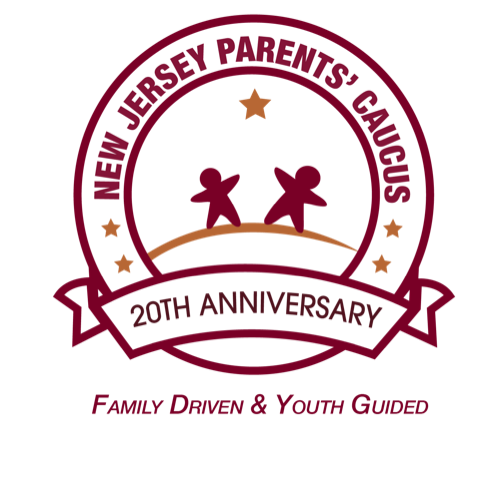
Our Approach
Our History
The New Jersey Parents' Caucus spearheaded a coalition of children's advocacy groups to change existing policy and provide services to families and children struggling with special needs. The coalition formulated the "Ten Principles of Care" which would eventually govern a new system. The principles were presented to family organizations, child-serving agencies, Boards of Chosen Freeholders, and other active legislators to gather support. In 1999, through diligence and hard work, NJPC achieved its long-range goal to convince state officials that the system serving children with mental health challenges was in dire need of change. On January 24, 2000, Governor Whitman adopted the "Ten Principles of Care" as a foundation for the new Children's System of Care Initiative (CSOCI). At last, this meant comprehensive reform for children's mental health services built on the foundation of partnering with families at all levels, from local to state, and at all phases of activity including planning, oversight and quality assurance. In the year 2000, NJPC incorporated with the mission to ensure that parents and caregivers of children with emotional and behavioral challenges were given an opportunity to play a strong and active role in the development and delivery of effective and timely services for their children.
For the next 2 and 1/2 years, NJPC was contracted by the Department of Human Services to serve as the statewide parent advocacy agency for the CSOCI. NJPC continues to support the CSOCI, by training parents and caregivers to better access services for their children, families and communities, prepare them for leadership opportunities in the child-serving arena and employment opportunities in child-serving agencies. In addition to our accomplishments with the State Department of Human Services, soon thereafter NJPC was selected as one of forty-two funded Statewide Family Networks through The Substance Abuse Mental Health Services Administration (SAMHSA) of the US Department of Health & Human Services and charged with working with youth, family members and professionals to improve outcomes for children with emotional and behavioral disturbances and their families. In 2005, NJPC was contracted by the SAMHSA TA Center to provide technical assistance to other Statewide Family Networks throughout the country to build capacity and ensure sustainability. NJPC also works with new family-driven grass roots organizations throughout New Jersey to help them build capacity. NJPC has served in a consulting capacity to the National Technical Assistance Center for Children's Mental Health at Georgetown University's Center for Child and Human Development and National Cultural Competency Center providing Transformation Facilitation Technical Assistance and Support to state children's mental health directors throughout the country.
In 2008, NJPC was selected as one of twelve organizations throughout the county and the only organization in the state chosen by the US Department of Justice/Office of Juvenile Justice & Delinquency Prevention (OJJDP) to provide family strengthening prevention services to families raising children and youth at risk of entering the juvenile justice and child welfare systems. NJPC's Families Uplifted Prevention Initiative is charged with providing family strengthening strategies and programs that focus on improving family economic success, family support systems, and building thriving and nurturing communities in which healthy families can purse long-term goals. Continuing to support parents raising justice-involved youth with emotional and behavioral challenges, NJPC developed the New Jersey Youth Justice Initiative (NJYJI), a family-driven justice program which seeks to improve outcomes for justice-involved youth, end the practice of waiving youth to the adult system, ensure family and youth involvement on all levels of decision-making, end solitary confinement for youth, and ultimately decrease recidivism rates through a myriad of supportive programs which include:
- Providing education to parents,family members and youth on their rights and responsibilities and the advocacy skills needed to navigate child-serving systems
- Providing free legal advice and representation to parents and youth by a qualified attorney
- Supporting attorneys at trial
- Providing leadership opportunities to system-involved youth through the NJ Youth Coalition
- Providing peer support programs for parents, family members and youth
- Increasing awareness through public testimonies and legislative advocacy
- Training juvenile justice professionals and providers
- Tracking and corresponding with youth who have current or prior involvement with the juvenile and adult system, and their parents, caregivers and family members and
- Providing evaluation and data analysis.
In the fall of 2014, NJPC published the data brief - Psychotropic Medication Use among New Jersey Children & Youth - in which more than 56% of children and youth reported the use of one psychotropic medication in the past year. In 2014, NJPC received a state spotlight and was highlighted by the National Juvenile Justice Evaluation Center (NJJEC), identifying our data analysis and evaluation studies representing more than 20,000 parent training hours and 6,000 children, which showed improvements in the utilization of mental health, special education, and developmental disability services, and declines in the involvement of children and youth in the juvenile justice system. The analysis also demonstrated reductions of family involvement in the child welfare system.
In addition, NJPC was highlighted in 2014 and 2015 by The National Center for Mental Health and Juvenile Justice (NCMHJJ) for the publication of the Navigating the Juvenile Justice System in New Jersey: A Family Guide and The Incarceration of Children & Youth in New Jersey's Adult Prison System: New Jersey Youth Justice Initiative which highlight the prevalence of children with mental health disabilities incarcerated in the adult system with nearly 70 percent of those placed in solitary confinement having a mental health diagnosis and nearly 37% having two or more diagnoses.
